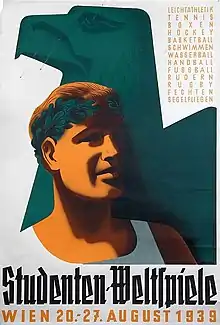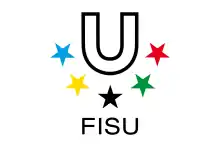1939 International University Games (Vienna)
An International University Games (German: Studenten-Weltspiele[1]) was an international multi-sport event held between 20–27 August 1939 in Vienna, German Reich (now Vienna, Austria),[1][2] which had originally been scheduled as the official 1939 staging of the Summer International University Games awarded to Vienna by the Confederation Internationale des Etudiants (CIE) in January 1938, prior to Austria's absorption into Nazi Germany by the Anschluss.[3][4] The National Socialist German Students' League (NSDStB) withdrew from the CIE in May 1939,[3] and the CIE at short notice moved its version of the 1939 International University Games to Monte Carlo.

The formal opening was by Bernhard Rust, the Reich Minister of Science, Education and Culture, on 20 August in the Prater Stadium, the main venue of the games.[5][6] The NSDStB invited many nations to the Vienna games, but most entrants were nations affiliated with the Axis powers.[3][7] The following countries were reported to have participated in the games: Kingdom of Bulgaria, Estonia, Finland, German Reich, Kingdom of Hungary, Kingdom of Italy, Empire of Japan, Peru, Slovak Republic, Spanish State, Union of South Africa, Sweden, and Kingdom of Yugoslavia.[8] The International Institute of Intellectual Cooperation stated in 1940, "The results of the Monaco Games were much superior to those of the Vienna Games."[9]
Athletics
Men’s events
| Event | Gold | Silver | Bronze | |||
|---|---|---|---|---|---|---|
| 100 Metres | 10.7 | 10.8 | 10.9 | |||
| 200 Metres | 21.8 | 21.9 | 22.0 | |||
| 400 Metres | 48.0 | 48.3 | 48.5 | |||
| 800 Metres | 1:53.9 | 1:54.4 | 1:55.3 | |||
| 1500 Metres | 3:57.2 | 3:58.4 | 3:59.6 | |||
| 5000 Metres | 15:10.6 | 15:10.8 | 15:28.6 | |||
| 110 Metres Hurdles | 15.1 | 15.3 | 15.4 | |||
| 400 Metres Hurdles | 54.0 | 54.5 | 56.0 | |||
| High Jump | 1.90 | 1.85 | 1.85 | |||
| Pole Vault | 4.10 | 3.90 | 3.90 | |||
| Long Jump | 7.09 | 7.03 | 7.01 | |||
| Triple Jump | 15.37 | 14.73 | 14.72 | |||
| Shot | 16.33 | 16.26 | 14.79 | |||
| Discus | 48.21 | 47.45 | 46.11 | |||
| Hammer | 53.54 | 49.21 | 48.85 | |||
| Javelin | 67.37 | 67.29 | 66.79 | |||
| Pentathlon | 3867 | 3273 | 3225 | |||
| 4 x 100 Metres Relay | 41.8 | 42.1 | 42.6 | |||
| 4 x 400 Metres Relay | 3:15.8 | 3:17.2 | 3:17.4 | |||
| 10 x 200 Metres Relay | 3:38.3 | 3:39.2 | 3:43.2 | |||
Women’s events
| Event | Gold | Silver | Bronze | |||
|---|---|---|---|---|---|---|
| 100 Metres | 12.4 | 12.6 | 13.0 | |||
| 200 Metres | 25.4 | 26.6 | 26.6 | |||
| 80 Metres Hurdles | 11.7 | 12.0 | 12.1 | |||
| High Jump | 1.50[fn 3] | 1.50[fn 3] | 1.50 | |||
| Long Jump | 5.21 | 5.19 | 4.90 | |||
| Shot | 12.44 | 12.43 | Unknown | Unknown | ||
| Discus | 37.43 | 36.51 | 35.07 | |||
| Javelin | 41.15 | 38.52 | 37.60 | |||
| 4 x 100 Metres Relay | 49.0 | 50.5 | Unknown | Unknown | ||
Other sports
Military sports were held at the games, reflecting the militarism of Nazi and fascist states.[10] Other sports included tennis, boxing, field hockey (Germany beat two Italian teams[11]), basketball, swimming, handball, association football, rugby, rowing, fencing, gliding, and water polo (won by Hungary[12]).[1]
Footnotes
- Kim Won-Kwon represented Japan but was from Korea. The Japanese gave his name as Genken Kim
- The source for these results gives no first name for this athlete
- There is uncertainty about this time per the source data
- Wanda Nowak represented Germany but was from Austria
References
Sources
- "World Student Games (Pre-Universiade)". GBR Athletics. Athletics Weekly.
- Oelrich, Harald (2003). "6.3.3 — Infiltrationsstrategie und Umsturzversuch: Die internationalen Studentenmeisterschaften 1939 in Wien". Sportgeltung - Weltgeltung: Sport im Spannungsfeld der deutsch-italienischen Außenpolitik von 1918 bis 1945 (in German). LIT Verlag Münster. pp. 389–393. ISBN 9783825856090. Retrieved 30 May 2016.
Citations
- "Studenten-Weltspiele, Wien 20.-27. August 1939". German Nazi posters from the Second World War era. UC Berkeley, Bancroft Library. Retrieved 22 May 2016.
- Rebhann, Fritz Maria (1995). Die braunen Jahre: Wien 1938-1945. Wiener Journal Zeitschriftenverl. p. 78. ISBN 9783853080139.
- "World Student Games: Surprise Change of Venue". The Glasgow Herald. 1 June 1939. p. 17. Retrieved 19 May 2016.
- Students in Search of Their University: An International "conversation" Between Students on "Education in the Modern University", Luxemburg, May 22-25, 1938. International Institute of Intellectual Cooperation. 1939. p. 162.
- "Feierliche Eröffnung der Studentenweltspiele 1939" (in German). Amsterdam: Beeldbank WO2 [Image Bank WW2]. Archived from the original on 2013-09-12. Retrieved 22 May 2016.
- "Das Wiener Stadion (Ernst-Happel-Stadion)". Wien.gv.at (in German). Vienna City Council. Archived from the original on 2016-08-07. Retrieved 22 May 2016.
- Kotek, Joel; Blumenau, trans Ralph (30 December 2015). Students and the Cold War. Palgrave Macmillan UK. pp. 242, note 3. ISBN 9781349248384. Retrieved 19 May 2016.
- Ernst Söllinger, Ein Münchener in Darmstadt (in German). Raimund Kluber. p. 89.
- "?". Intellectual Co-operation Bulletin. International Institute of Intellectual Co-operation: 134. 1940.
- Teja, Angela; Arnaud, Pierre; Riordan, James (2003) [1998]. "Italian sport and international relations under fascism". Sport and International Politics. E & FN SPON. p. 147. ISBN 0-203-47658-1.
- Happ, Martin. "Deutscher Hockeysport 1937-1939: Vergessene Aspekte der deutschen Sportgeschichte?" (MS Word). LISA (in German). Düsseldorf: Gerda Henkel Stiftung. Retrieved 22 May 2016.
- "A University Athlete like No Other". International University Sports Federation. 28 August 2015. Retrieved 22 May 2016.
Further reading
- Teichler, Hans Joachim (1984). "Nationale Und Internationale Meisterschaften Im Studentensport Vor Dem 2. Weltkrieg. Zum Weg Des Deutschen Studentensports Von Der Sportlichen Zur Sportpolitischen Hegemonie in Europa". Hochschulsport : Magazin Des ADH (in German). Allgemeiner Deutscher Hochschulsportverband. 11 (2): 4–14.

